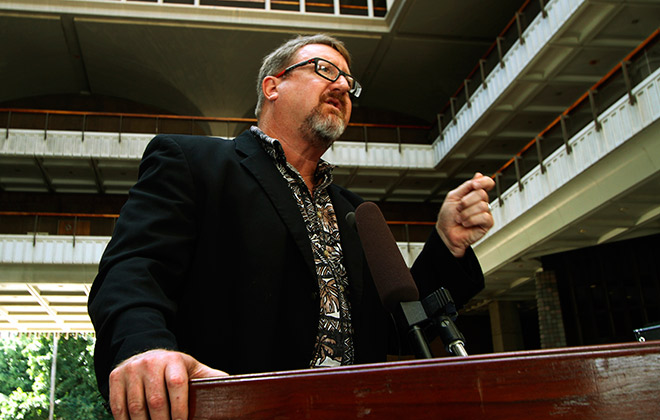Justices question challenge to same-sex marriage law

A Circuit Court judge ruled last year that the new law is constitutional, but Rep. Bob McDermott, an opponent of gay marriage, appealed.
With legal opinion nationally shifting toward marriage equality, justices on the state Supreme Court on Thursday took a skeptical view of a state House lawmaker’s challenge to Hawaii’s marriage law.
Justices peppered Shawn Luiz, an attorney for Rep. Bob McDermott (R, Ewa Beach-Iroquois Point), with questions to explain why the state Legislature and then-Gov. Neil Abercrombie were precluded by the state Constitution from enacting a same-sex marriage law after a special session last year.
A Circuit Court judge ruled last year that the new law is constitutional, but McDermott, an opponent of gay marriage, appealed.
Luiz argued that a voter-approved state constitutional amendment in 1998 that gave the Legislature the authority to restrict marriage to heterosexual couples could not be altered without another constitutional amendment.
The legal landscape has changed rapidly over the past year, when Hawaii became the 15th state to allow gay marriage. Thirty-five states and the District of Columbia now recognize same-sex marriage.
The 9th U.S. Circuit Court of Appeals, which covers Hawaii and other Western states, ruled in October that preventing gay couples from marrying is unconstitutional, a decision that legalized gay marriage in Idaho and Nevada. The court also found a challenge by gay couples in Hawaii to the state’s old marriage law moot in light of the same-sex marriage law.
Don't miss out on what's happening!
Stay in touch with breaking news, as it happens, conveniently in your email inbox. It's FREE!
"In essence, you’re asking us to call a law unconstitutional … under an unconstitutional provision," Associate Justice Richard Pollack said.
Luiz said it would be speculation to presume the 9th Circuit would have struck down Hawaii’s old marriage law. He noted that a few federal courts have upheld bans on gay marriage, and that the U.S. Supreme Court has not settled the question nationally.
The Supreme Court ruled last year that legally married gay couples have a right to federal benefits, but for now has left it up to individual states and the lower courts to determine whether to legalize same-sex marriage.
Luiz argued that the 1998 state constitutional amendment, like other amendments, occupies legal space that cannot be undermined by the Legislature. He said, for example, that lawmakers could not pass a law that banned guns.
Chief Justice Mark Recktenwald and other justices also questioned whether McDermott and others who challenged the marriage equality law have legal standing because the law has in some way injured them.
Luiz said McDermott’s House vote to place the constitutional amendment on the ballot — and his vote for the 1998 constitutional amendment — were nullified by the same-sex marriage law. The votes of others in 1998 were nullified as well, Luiz said.
Luiz said the challengers have dropped other claims of injury, such as McDermott’s contention that his reputation suffered because he told people that the 1998 vote would ban gay marriage. Another challenger, a community liaison pastor and marriage coach, claimed he might be sued if he declined to perform marriage coaching to gay couples because of his faith.
Deputy Attorney General Deirdre Marie-Iha told the court that McDermott and the others lacked legal standing. She said McDermott’s vote for the 1998 amendment was not nullified, because it had the practical effect of preventing same-sex marriage in Hawaii for 15 years.
Marie-Iha said McDermott and the others have cast the 1998 amendment as a ban on gay marriage, when what it really did was give the Legislature the option of restricting marriage. The Legislature also has separate authority under the state Constitution to approve same-sex marriage, she said.
"They want this to be a ban on the recognition of marriage for same-sex couples, but it just doesn’t say that," she said.
Recktenwald said the court would take the arguments under advisement.
Afterward, McDermott acknowledged that the questions from the justices were tough on his case.
"We’ve laid our case out. We think we have legitimate issues," he said. "I think the fact that they heard it is important. I was there in 1998. I know what the people wanted. I know what it meant. I know what the ballot instructions say.
"So that was the chance to get our day in court. And we got it."




